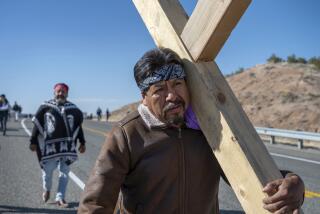Surgical charity fills a need in L.A.
Five years ago, Inglewood surgeon Robert M. Shorr started a nonprofit foundation, Surgeons of the Earth, to help poor communities with high rates of gallbladder disease. Every year, he travels to the Dominican Republic, Guatemala or El Salvador, delivering donated equipment and teaching local surgeons to do laparoscopic gallbladder surgery, his specialty.
Today, Shorr takes his foundation’s services to one of the communities that needs it most -- the one outside his own door.
In Los Angeles County, where a quarter of the population lacks health insurance, an uninsured adult may wait a year or longer for gallbladder surgery at a county-owned hospital. So Shorr, his two partners in his surgery practice and three anesthesiologists are holding something of a gallbladder marathon: a day of free surgery for uninsured patients.
Centinela Freeman Regional Medical Center, the private for-profit hospital in Inglewood where Shorr and his partners practice, is donating the surgical suites and the salaries of the nurses for the day.
“I’ve always known that the need is here,” Shorr said. “But I wasn’t sure I could pull it off in the U.S.”
The county’s 117 public-private community clinics -- which treat about 600,000 low-income patients a month for flu, prenatal care, immunizations and other needs -- are not equipped to do gallbladder or other surgery. No one knows exactly how many patients have been referred for surgery at the county’s four remaining hospitals, but it is known that the waits have grown longer since the county downsized Martin Luther King Jr.-Harbor Hospital in Willowbrook, just south of Watts, to an out-patient clinic.
“The county hospitals do an excellent job trying to get [patients] in, but the demand is greater than the resources available,” said Dr. Grace Floutsis, medical director of Clinica Msgr. Oscar A. Romero, which has sites near downtown and across from County-USC Medical Center.
Floutsis had no trouble finding patients for Shorr when he contacted the clinic about his project.
Maria Gutierrez, 61, is one of 10 patients scheduled for surgery today. A Salvadoran immigrant who has lived in Los Angeles for 25 years, she works as a housecleaner to support herself and her 82-year-old mother. For the last three months she’s suffered sharp, stabbing abdominal pains that have caused her to take time off work -- without pay.
“We’re incredibly grateful,” Floutsis said. Shorr’s “understanding of the need here is a great thing.”
Dr. Ronald Hurst, a partner of Shorr’s who has accompanied him to Central America, said that volunteering fulfills a longtime dream to do missionary work.
Shorr found his inspiration in Manny Mota.
The veteran Los Angeles Dodgers player and coach is as renowned for his philanthropy as he is for his All-Star pinch-hitting. The men met when Mota had an appendectomy at Centinela in 2001. At first he was Shorr’s patient; he then became the surgeon’s mentor.
Shorr was ripe for conversion.
His growing frustration with the way medicine is practiced in the United States -- the regulations, the paperwork and the ever-present threat of malpractice lawsuits -- had led Shorr, now 55, to question whether he wanted to stay in the profession.
“I’d kind of soured on how things were going in this country,” he said. “I was losing the reasons why I became a doctor.”
At Mota’s invitation in 2002, Shorr traveled to the Dominican Republic to see the work being done by the Manny Mota International Foundation. Mota and his wife, Margarita, started the foundation more than 30 years ago to help disadvantaged children in the U.S. and in their native country.
Shorr found a lot of inflamed gallbladders.
The gallbladder stores excess bile produced by the liver to aid in digestion. This liquid bile can harden into small bits called gallstones, which in turn can move around and block ducts that lead to the small intestine, causing acute abdominal pain. If the ducts remain blocked, they can eventually cause severe, even life-threatening, infections.
Shorr supplied the equipment and taught Dominican surgeons to remove ailing gallbladders (which people can live without) using laparoscopic surgery, the method common in more affluent countries. A tiny camera mounted on a long, thin scope and other instruments are inserted through four small openings in the abdomen. Patients are able to go home the day of surgery rather than spend up to a week in the hospital recovering from a large, painful incision.
After several trips to the Dominican Republic, Shorr and the foundation he started with his wife, Anatora, moved into El Salvador and Guatemala. Although such factors as diet and obesity contribute to gallbladder disease, medical researchers believe that indigenous tribes in both North and South America have a genetic predisposition to developing gallstones, as do Latinos of mixed-Indian heritage.
Latinos make up about 40% of Los Angeles County’s population.
“The same types of patients that we’re traveling thousands of miles to take care of aren’t very far from our own neighborhood,” Shorr said.
Still, to arrange for 10 free surgeries took almost a year of planning, he said.
The day is costing Centinela Freeman about $160,000 in waived charges, according to hospital spokeswoman Alita Bernal. Shorr estimates that the surgeons and anesthesiologists are donating between $8,000 and $13,000 in fees. The combined costs -- about $170,000 -- don’t include the scopes and cameras donated by medical equipment corporations, Shorr said.
This is believed to be the first time a hospital in Los Angeles County has scheduled a full day of free surgeries.
Although 10 surgeries are more than the five or six that Shorr’s practice typically does in a single day, he said the number is a drop in the bucket.
“There’s a huge amount of doctors who want to help,” he said. “It’s a huge reminder of why we went into medicine to begin with.”
--






